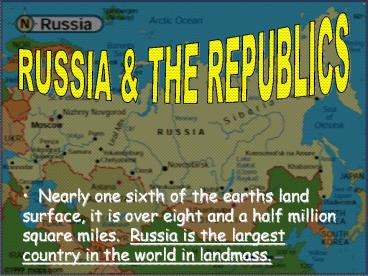RUSSIA - PowerPoint PPT Presentation
1 / 17
Title: RUSSIA
1
RUSSIA THE REPUBLICS
- Nearly one sixth of the earths land surface, it
is over eight and a half million square miles.
Russia is the largest country in the world in
landmass.
2
VOLGA RIVER
- The Volga river is the 4th longest river in
Russia and the longest river in Europe - Draining much of Russias North European Plains,
the Volga River and its canals link the Moscow
area to the Caspian Sea, the Black Sea and Baltic
Seas.
3
Siberian Rivers
- Siberian Rivers flow north to the Artic Ocean.
- Blocked by ice, the melted waters often flood the
land and create vast swamps.
4
Ural Mountains separate Northern European Plain
and West Siberian Plain. Divides Europe and Asia
5
Lake Baikal oldest and deepest freshwater lake
in the world. It contains 20 of worlds
freshwater and located in Siberia.
6
Other Lakes
Aral Sea Central Asian lake located between the
countries of Kazakhstan and Uzbekistan. Once one
of the worlds largest lakes. It is shrinking
due to over irrigation.
Caspian Sea Worlds largest lake. Much of
Central Asias petroleum reserves are here.
7
NATURAL RESOURCESMinerals and Energy
- Russia has huge mineral resources.
- It is especially rich in mineral fuels such as
oil, natural gas, and coal - Russias rivers make it a leading producer of
hydroelectric power.
8
Trans-Siberian Railroad Longest railway in the
world extending from Moscow to the Sea of Japan.
Facilitated the settlement of Far-East Russia and
the export of resources from Siberia.
9
SOIL AND FOREST LAND
- Because of Russias generally cold climate, only
about 10 of its land is suitable for farming. - Chernozem is a rich, fertile soil Black Earth
Belt that stretches from Ukraine to Southwestern
Russia, supplying the country with grains, sugar
beets and other produce. - Russian forests supply much of the worlds timber.
10
Russias Fishing Industry
- Fish is a staple food in Russia and also an
important export product to the rest of the
world. - What item is served at fancy cocktail parties
with champagne?
11
RUSSIAS CLIMATE AND VEGETATION
- Most of Russia has a harsh climate with long,
cold winters and short, relatively cool summers. - Lying well within the Eurasian landmass, most of
the country is far from any moderating ocean
influences.
12
HIGH LATITUDE CLIMATES THE TUNDRA
- The tundra, a vast, treeless plain, covers about
10 of Russia - The weather is always cold, and little grows
there because of the short growing season and the
thin acidic soil.
Tundra flowers and vegetation
13
HIGH LATITUDE CLIMATE THE SUBARTIC
- The sub arctic lies just south of the tundra.
- The sub arctic has snow for up to 250 days of the
year - The taiga is a forest belt in the sub arctic that
is the worlds largest coniferous forest. - It contains 1/3 of the worlds softwood timber.
14
LIVING IN A HIGH LATITUDE CLIMATE
- Russians must be creative to live in an extremely
cold climate. - Builders plan for the cold when they construct
buildings, and cars are made from a special type
of steel that will not crack in the cold. - Large amounts of oil, gas, wood, and coal are
used to keep warm
15
MID LATITUDE CLIMATESHUMID CONTINENTAL
- Most of the North European Plain and some of
southern Siberia have a humid continental
climate, with long snowy, relatively mild
winters. - This climate is similar to what we have in the US
Midwest and Northeast. - Farther south, the forest gradually merge into
temperate fertile grasslands.
16
WAR AND WINTER
- Russias cold climate was helpful in World War II
because Russian soldiers, who were used to the
cold, fought well against the German soldiers,
who were unprepared for a brutal winter - The Russian Winter in essence, helped defeat the
Nazi Army.
17
MID LATITUDE CLIMATESSTEPPE
- The steppe, is a savanna, it is climate region
has dry summers and long, cold, dry winters. - Its rich soil enables a variety of grasses and
plants to flourish.































